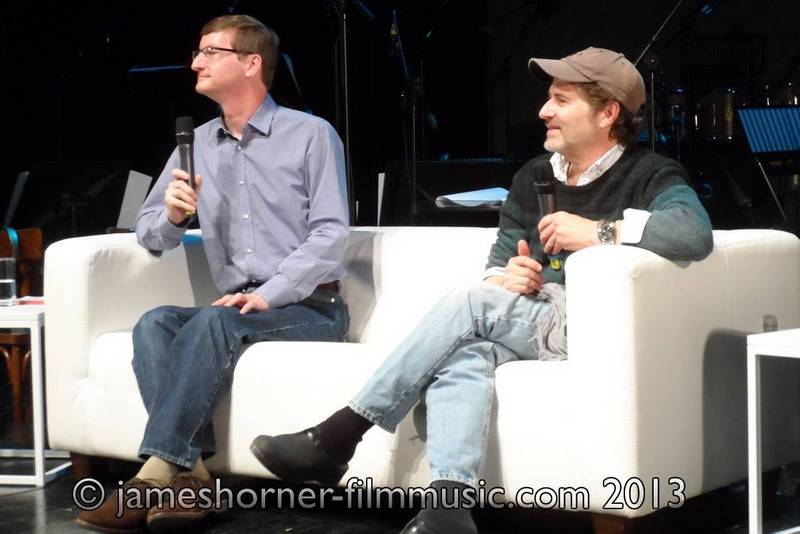[divider]VARIOUS QUESTIONS[/divider]
An audience member asked James Horner about the role of synthesizers and electronics over the years in his writing.
The composer replied:
"I have always been on the cutting edge of the textures, be they electronic, be they weird instruments from wherever the world, ethnic instruments… I started using electronics a lot; maybe because I was doing more of improvisatory scores–you would never know that they were improvised because there were no notes. I would do the scene and I would just play it piece by piece into the film until the scene is completed and there were no notes. When I first started doing it, no one had done that before and the studios were anxious because the copying department would say "Where is the music?" and I would say, “Well… there isn't any music. None of it was written down,” and for copyright reasons that's very dangerous. You had to have everything written down But I used a lot of–When I say electronic music, things look beautiful for me but I can't get out of the real person playing it … I would either sample it or I will create it and I'll play it by myself by the way I hear it. That’s very often what I’ve had to do.

Someone else asked him if he had in fact studied with the composer, György Ligeti.
"I was going to college at the Royal College of Music and I was studying what everybody studies in college: Bach… I was completely, in my own head, in a different place. I was writing requiem masses and I was thinking of arias and different worlds… I left college after my 2nd year. I took time off and I went to Hamburg and studied with György Ligeti. We didn’t study so much his music, but we studied Renaissance music which was a love of mine in college and a love of his, and if you study Lux Aeterna or his requiem or a lot of the Ligeti pieces, they are put together in a way that I very much admired in a very traditional way ends up sounding very atonal. When we first heard Lux Aeterna in 2001, when you first heard these pieces, they were considered as avant-garde in those days; but, really, they were put together like Renaissance pieces and his voicing was very similar. I was intrigued by that and I did study with him. I was also interested in studying in Benjamin Britten. I had all these weird things that I liked, Prokofiev… None of the stuff was particularly taught in college, it was just the particular interests that I had."
Finally, one last person requested the composer if he would recommend a classical education to someone who wants to work in the film industry. James Horner asserted:
"No. I don't think classical. I came at that angle because I've been playing the piano most of my life and it was just a natural thing to go into a conservatory, to study music. I would not say, going into being a film writer these days that’s at all important. I think it is important to have an artistic vision that's appealing or attractive to somebody, but I don't know whether the education matters like it used to. You are talking to somebody like–I feel so over-educated for where I ended up. I vowed never to get back into to classical music, and here I am reexamining it. But I do think audiences now, (as I said earlier) the world has changed, and classical music has not changed so much, and that's why classical music is very difficult and why so few new pieces have been written, why so few pieces are being commissioned. Because the audiences have gone down, younger generations don't necessarily want to hear Brahams played in dark room. They want to hear, as I said, multi-media–to have music mated with something else going on, and I think that film does that, dance does that—stunningly–and it's very important to whatever you do as a composer works with these new media."
He concluded by saying:
"I think for a composer coming out of the world, whether it be a school, streets or whatever, if you want to do something, it’s either for commercial use, via the radio, or visual use, in film. I think that’s the most viable outlet for a writer. But, I don't think you have to have this crazy education to get there. I think people I've met are brilliant have no education at all, they just had a gift."
[divider]EPILOGUE[/divider]
At the conference’s conclusion, twenty or so people approached James Horner for a photo or an autograph. Only the first few were lucky, as the festival’s organizers wanted to shorten this moment of sharing, to prevent overwhelming crowding.
The day after the conference, Robert Towson said:
"What a lovely afternoon in Vienna. It was an absolute pleasure to conduct Hollywood In Vienna's symposium with James Horner. We had afabulous discussion reflecting on his long career, exploring his creative process of writing film music and also taking time to view clips from A Beautiful Mind, Braveheart, Legends of The Fall, Avatar and Titanic… with more detailed talk about these particular scores. The audience was wonderful. Completely mesmerized by James's eloquent words. When we did finally turn to the audience for questions, the first gentleman we gave the microphone said that he had so many questions and didn't know what to ask, so he texted his daughter in Istanbul to ask for advice. Her beautiful suggestion was to just make sure that James knows he is loved. I'm certain that the afternoon made this point very clear to James. A very special and historic day in Vienna."
source: Varese Sarabande Facebook Page



